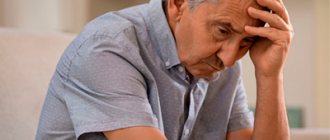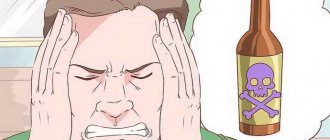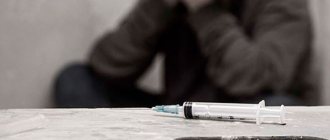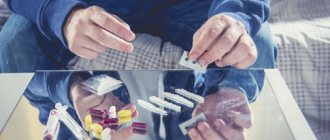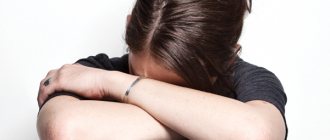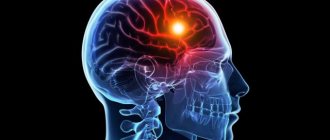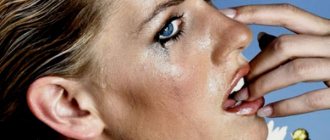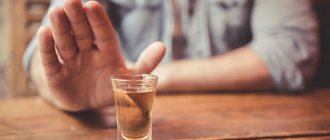Data
· There is a misconception that alcohol helps you sleep better and stay asleep. This statement is erroneous, since such phenomena are short-term and entail the opposite effect.
· To determine a treatment regimen for insomnia, it is necessary to exclude possible diseases that provoke sleep disturbances, and if they are identified, then they should be treated first.
· Short-term periods of insomnia that occur as a result of a single drink of alcohol often go away on their own. But if the lack of adequate sleep is a consequence of alcoholism , then the first step to recovery will be to stop drinking alcohol.
· In severe alcohol dependence, detoxification and treatment of withdrawal symptoms are the first stage of therapy.
· Subsequent treatment for insomnia includes complete abstinence from alcohol , taking sleeping pills, behavioral changes and good sleep hygiene. The complex of these measures has the best and longest lasting effect.
· It is important to treat withdrawal symptoms promptly to prevent subsequent depression or brain damage following sleep disturbances.
Physiological aspects of night rest
There are two main phases of sleep - fast and slow, which replace each other throughout the night with an interval of about one and a half hours (normally - 5 cycles). The quality of rest is determined by circadian rhythms and physiological processes. The former are “responsible” for the duration and time of falling asleep, the latter regulate a person’s behavior when tired and the functioning of internal organs during different phases of sleep. Chronic lack of sleep is very dangerous. Adequate rest is necessary to restore and maintain energy balance in brain cells and improve mental activity. Not only insomnia, but also a violation of sleep phases is accompanied by a decrease in immune defense, cardiovascular, emotional and behavioral disorders. Insomnia is one of the risk factors for the development of alcoholism, and even with an existing illness it can cause a relapse.
When is it time to ask for help?
You should immediately call a doctor at home in the following cases:
· A person cannot fall asleep independently for 24 hours or more or sleeps less than 5 hours for 3 or more days.
· Against the background of chronic lack of sleep, symptoms of depression or alcoholic schizophrenia , causeless aggression or delirium tremens .
· An epileptic seizure .
· Despite the fact that problems with sleep have appeared, the alcoholic cannot independently get out of the binge and abstain from drinking alcohol.
· While intoxicated, the person used a sleeping pill and felt unwell.
In these cases, call a narcologist to your home, who will detoxify the body, calm the patient, help him get out of the binge, and select effective drug treatment .
What happens when you drink alcohol occasionally?
The concentration of ethanol in the blood is not constant throughout the rest period (on average, 7-8 hours). After a noisy feast, a short-lived euphoria occurs, followed by a feeling of fatigue and lethargy. The duration of the stage of falling asleep is significantly reduced, and the first half of night sleep is mainly represented by the deep phase. After a few hours, the concentration of ethanol gradually decreases, its metabolites accumulate, which also cannot but affect the physiology of rest. Deep sleep in the first half of the night gives way to rapid and restless sleep. As a result, a person gets out of bed “broken” and tired; after waking up, he constantly tries to cheer himself up with coffee and energy drinks, which also makes it difficult to fall asleep in the evening. But it takes several days to restore a full sleep pattern. In 10-15% of cases, another portion of alcohol is taken as a sleeping pill. At first, the use of ethanol-containing drinks is episodic, but there is a high probability of developing a stable addiction, especially against the background of a psychological or genetic predisposition.
How to fall asleep after a binge or a hangover at home
Here folk recipes for insomnia after alcohol can come to the rescue. These are mainly infusions and decoctions of herbal preparations. Since nowadays few people grow or collect medicinal herbs, a trip to the pharmacy cannot be avoided. There is an abundance of this goodness for all occasions. Although people living in a private house on the land may already have a mint or lemon balm bush on their property, hops hanging on the fence, or supplies of dried linden inflorescences. So, if you can’t sleep, tinctures or decoctions of the following herbs can help:
- Hop cones
- St. John's wort
- Linden with mint and lemon balm
- Motherwort (not recommended for low blood pressure)
- Valerian
- Oregano
You should also be careful with all decoctions, because if you overdo it, the active ingredients in their composition in combination with alcohol can be harmful.
Popular wisdom quickly tells you how to fall asleep with a hangover at home. Tested available remedies include:
- One or two tablespoons of honey, washed down with a glass or two of warm milk. It begins to act in 10-15 minutes, so it is better to drink milk with honey in bed so as not to miss the moment. Honey is a strong vasodilator (so do not take it if you have a headache, it can make it worse), and has a calming and hypnotic effect. Food in the gastrointestinal tract begins to be digested only when it heats up or cools down to body temperature (approximately 37 degrees) and acquires a liquid consistency. Warm milk is a product that has a very nutritious and beneficial composition, binds a number of toxins and alcohol and begins to be absorbed in the stomach. Thus, giving the body a signal to relax - to reduce the production of steroids by the adrenal glands, which prevent the absorption of poison from the intestines, are too invigorating and prevent you from falling asleep.
- Ear plugs (or tampons) if there is no tinnitus.
- Monotonous actions. Read a boring book or slowly stroke your cat or wife, while thinking only about stroking. Often 10-15 minutes of such manipulations are enough. For example, the monotonous voice of the lecturer helps students fall asleep after a hangover.
- Joining the breathing rhythm of another sleeping organism (this could be a domestic cat or dog nearby, or a wife (husband). If they can withstand your fumes and do not run away. The method is very effective. The purring of a cat often helps if there is no noise phobia.
Alcoholism disorders
Insomnia and pathological craving for alcohol are closely related. Insomnia is noted in 90% of patients during periods of long-term alcohol abuse. Sleep disturbances after binge drinking persist for several weeks after detoxification (provided they give up alcohol); in some patients, these disorders continue for 1-2 years.
The person is concerned about:
difficulty falling asleep;- shallow sleep with frequent awakenings;
- constant feeling of tiredness during the day;
- sleep apnea;
- realistic nightmares;
- unconscious, convulsive movements of the arms and legs.
In addition, the structure of night rest itself changes.
For persistent alcohol dependence:
- the duration of the falling asleep phase increases;
- in general, the duration of rest decreases;
- the order of the cycles of rapid and slow sleep is disrupted.
In case of acute withdrawal syndrome, the patient may, unnoticed by himself, “fall into a shallow sleep” during the period of wakefulness. This is usually accompanied by auditory and visual hallucinations followed by psychosis (delirium). But in most patients, after proper therapy and abstinence from alcohol, the quality of sleep is completely restored.
Bibliography:
- Yu.A. Azimova, K.A. Ishchenko. Sleep disturbances in alcoholic illness: diagnosis and therapy. — University Headache Clinic, Moscow. - Medical advice. Neurology. 2021.
- Leonovich A.L., Shilkevich L.V., Kudlach A.I. Modern features of the course of neurological complications of chronic alcoholism. — State Educational Institution “Belarusian Medical Academy of Postgraduate Education”, Minsk. - International Neurological Journal, No. 6(84), 2021.
- Damulin I.V. Neurological disorders in alcoholism. - Neurological Journal, vol. 9, no. 2, 2004.
- Mironenko T.V. Neurological syndromes of chronic alcoholism. - International Neurological Journal, No. 6, 2010.
Therapy for insomnia in alcohol addiction
Treatment of insomnia in alcoholism is a complex process that includes medication and psychotherapy, correction of the daily routine, and herbal medicine.
First of all, the very cause of insomnia – the pathological addiction to alcohol – should be eliminated. For this:
All ethanol metabolites are completely removed from the body. In severe cases (for example, prolonged heavy drinking), detoxification therapy is carried out in a hospital setting under 24-hour medical supervision.- Normalize the functioning of the central nervous system. As a rule, B vitamins and psychotropic drugs are used for this purpose (during the period of acute abstinence).
- Restores the functions of internal organs. Hepatoprotectors, cardioprotective medications, enzymes, antioxidants, nootropics, etc. are used.
- They begin a course of psychotherapy.
- They code for addiction using medications, physiotherapy, and proprietary hypnosis techniques.
- They offer a rehabilitation course to consolidate the achieved effect.
Treatment for insomnia begins after detoxification. The fact is that when stopping a drunken state and to alleviate withdrawal symptoms, the patient is usually administered potent psychotropic drugs from the group of barbiturates or benzodiazepines. Such drugs are not suitable for long-term use due to the risk of developing dependence. Therefore, “softer” medications are selected (taken for 2-3 weeks), then the patient is transferred to products containing medicinal plants (valerian, lemon balm, etc.). When circadian rhythms change (wakefulness at night and sleepiness during the day), melatonin-based medications are recommended.
Non-drug correction methods play an important role. Advise:
go to bed and wake up at the same time;- give up daytime rest;
- limit the consumption of caffeine-containing drinks (no more than one cup after waking up), completely avoid energy drinks;
- moderate physical activity 3-4 hours before the planned fall asleep (walk in the fresh air, light jogging)
- water procedures (warm bath, shower, but not contrast);
- in the evening (especially while lying in bed) stop reading or watching videos from the screens of a smartphone, tablet, or computer games;
- have dinner no later than 18.00-19.00.
The combination of drug therapy and correction of the daily routine helps in 9 out of 10 cases.
But the main condition for normalizing sleep is giving up alcohol. Need some advice?
OR CALL A DOCTOR
CALL!
+7
What are the consequences of the combination of alcohol and sleeping pills?
Using sleeping pills for a hangover is not advisable. If possible, it is better to use herbs, physiotherapeutic procedures, aromatherapy and other methods. Tablets and drops have contraindications and complications. Combining them with alcoholic drinks is especially dangerous.
Why are doctors categorically against it when sleeping pills, sedatives and other medications are taken with alcohol? A biochemical interaction occurs between the drug and ethanol. As a result, both the effect of the drug and the effects of intoxication are distorted. Everyone knows that there are difficult and even deadly combinations. What consequences are observed from this interaction:
- The medicinal pharmaceutical properties are significantly reduced or greatly enhanced;
- The person may fall into a coma. Or it can react as if it were anesthesia or even anesthesia. Unconscious state - without self-regulation;
- Powerful intoxication leads to massive death of brain neurons;
- The risk of cardiac arrest, respiratory blockage, and internal bleeding increases significantly;
- As a result of the combination of ethyl alcohol and drugs, a “toxic bomb” can be formed, literally shutting down the liver from working;
- The degree of withdrawal syndrome (alcohol withdrawal) can become critical.
Those. There are many factors that, both individually and in combination, can lead to death.
Factors influencing the degree of damage to the central nervous system
How strong the negative impact on the nervous system will be after binge drinking depends on a number of factors:
- Duration of the binge. The larger it is, the more serious the damage.
- Hereditary predisposition. People whose relatives have diseases of the nervous system are at greater risk of complications.
- Paula. It has been observed that in women the side effects of alcohol appear earlier.
- Age. In older people, brain disorders are more active.
- The individual sensitivity of the drinker's body to the toxic breakdown products of ethanol.
- Volume of doses taken. If two ppm of ethanol is detected in the blood, a person suffers from coordination problems; if four, he loses consciousness. Eight ppm is a deadly dose, at which cerebral edema and respiratory arrest often occur.
